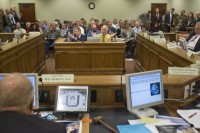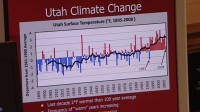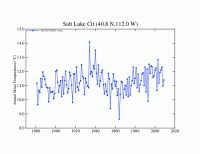Democrats are Abandoning Obama on Global Warming
By Lawrence Solomon
Only 50% of Democratic voters in the U.S. agree with President Obama’s belief that humans are responsible for global warming, according to a new poll from Pew Research Center released today. This figure is down from the 58% average among Democrats in the last three years of the Bush Administration, and represents the first time that a majority of Democrats have not endorsed the man-made theory of global warming.
Independent voters in the U.S., meanwhile, have stopped blaming humans for global warming in even greater numbers. Only 33% now blame us. Last year, independents believed humans were to blame at the same 50% level that Democrats are now at. Republicans are also abandoning the “blame human” stance, dropping from 27% last year to 18% this year. Among all Americans, only 36% blame humans, the lowest figure yet. Last year, 47% blamed humans. See story here.
Survey Says: Americans Not Worried About Global Warming
By Stephen Power, WSJ Blogs
A new poll out today on Americans’ attitudes about climate change presents sobering findings for those that favor aggressive action to curb U.S. emissions of greenhouse gases. The survey by the Pew Research Center for the People & the Press finds a sharp decline over the past year in the percentage of Americans who see solid evidence that global temperatures are rising. According to the survey, conducted between Sept. 30 and Oct. 4 among 1,500 adults reached on cell phones and landlines, fewer respondents also see global warming as a very serious problem; 35% say that today, down from 44% in April 2008. The survey also points to a decline in the proportion of Americans who say global temperatures are rising as a result of human activity. Just 36% say that currently, down from 47% last year.
The decline in the belief in solid evidence of global warming has come across the political spectrum, but has been particularly pronounced among independents. Just 53% of independents now see solid evidence of global warming, compared with 75% who did so in April 2008. Republicans, who already were highly skeptical of the evidence of global warming, have become even more so: just 35% of Republicans now see solid evidence of rising global temperatures, down from 49% in 2008 and 62% in 2007. Fewer Democrats also express this view - 75% today compared with 83% last year.
Many polled were ignorant of cap-and trade - more than half (55%) say they haven’t heard about so-called “cap and trade” legislation being considered in Congress. (Then again, Sen. John Kerry says he doesn’t know what “cap and trade” means, either.) They better learn quickly before they find themselves blindsided and knocked down a few steps on the economic ladder.
See WSJ blog here and full report here.
Economy trumps climate as concern
By Andy Barr, Politico
For voters, the economy outpaces all other issues by a wide margin, according to a new Public Strategies Inc./POLITICO poll
As the nation struggles to climb out of a recession, 45 percent rated the economy as the most important issue in deciding their vote if the congressional election were held today, followed by 21 percent who said government spending, 20 percent who chose health care reform and 9 percent who said the wars in Iraq and Afghanistan. Just 4 percent ranked climate change as the top issue.
Economic worries also led a majority of Americans to place jump-starting the economy ahead of concerns about the environment. Even as the Obama administration is pushing for climate protection legislation, 62 percent of those polled agreed that “economic growth should be given priority, even if the environment suffers to some extent.”
For much more on these polls, go here.
Fewer Americans Believe in Global Warming
In this CBS take on the story here, “earlier polls, from different organizations, have not detected a growing skepticism about the science behind global warming.”
Since 1997, the percentage of Americans that believe the Earth is heating up has remained constant - at around 80 percent - in polling done by Jon Krosnick of Stanford University. Krosnick, who has been conducting surveys on attitudes about global warming since 1993 was surprised by the Pew results. He described the decline in the Pew results as “implausible,” saying there is nothing that could have caused it.
Nothing but 8 years of global cooling, the coldest July in 115 years in the Corn Belt, all-time record snows in many northern tier areas (and record or first time snows in many areas around the globe even in the subtropics) two winters in a row and record cold start to October, 26% increase of arctic ice (32% incease in second year ice), a record low amount of antarctic ice melt and record high sea ice extent, ocean heat content dropping, sea level rises stalled and on and on and on. Krosnick continues as clueless as ever and yet another embarrassment to the once great Stanford University.
Despite the shift in public opinion the totaly oblivious and agenda driven congress and symapthetic President is likely to continue marching forward with legislation and support for a Copenhagen treaty. Don’t take this lightly. On October 14, Lord Christopher Monckton gave a presentation in St. Paul, MN on the subject of global warming. In this 4-minute excerpt from his speech, he issues a dire warning to all Americans. Please forward this link to everyone you know. 55% of Americans are totally unaware of what is afoot and need to recognize the impacts of the treaty and also the cost sans ANY benefit of cap-and-trade.
May I suggest this week you rent or watch from your collection the Mel Gibson movie, The Patriot. It is a moving film that shows you the great sacrifices the patriots made to bring freedom to our great country and makes you appreciate what we have enjoyed all this years and why so many have flocked to this country. This freedom is now at risk of being relinquished to a one world government under the UN. This was even indicated in speech by Al Gore at Oxford, who viewed Cap-and-Trade as an important next step to achive one world governance.
By Judy Fahys, The Salt Lake Tribune
Climate scientists gave lawmakers a primer Wednesday, advising them that temperatures are increasing. It was the first time such experts have been invited to testify at the Utah Legislature.
But Jim Steenburgh of the University of Utah and Roy Spencer of the University of Alabama-Huntsville offered the Legislature’s Interim Public Utilities and Technology Committee sharply different views of how well-understood climate change is. And, in the end, lawmakers wondered aloud whether learning more will help them make sensible policy.
“I cannot express the frustration I feel as a policy-maker who is not a scientist how difficult it is for me to make policy decisions when it seems the science has become so politicized,” said Rep. Lorie D. Fowlke, an Orem Republican and attorney.
“I hope the scientific community in some way will be able to reach a broader consensus,” she added. “And I appreciate those who are willing to look at other options before we invest our entire future on science that may not be conclusive.”
Several lawmakers expressed a similar uneasiness about making policy on what they see as an ongoing debate in the scientific community. That despite a recent poll published by the American Geophysical Union that found that 97.4 percent of active climate researchers consider human activity a significant contributing factor to recent warming—a point shared with lawmakers by Steenburgh, professor and chair of atmospheric sciences at the U.

See larger image here.
Spencer, an expert on using satellites to measure Earth’s systems, says the consensus stems from too many scientists having a “going with the flow” attitude based on limited data. He said too many uncertainties remain to conclude that mankind is behind global warming and that costly steps are needed to reverse the trend. Spencer, whose work focuses on the impacts clouds have on climate change, said natural climate cycles are largely responsible.
“From a scientific perspective,” he said, “this is simply astounding.”
The Integovernmental Panel on Climate Change—which was “formed by politicians and bureaucrats”—has “ignored” the evidence, he asserted.
“Natural climate cycles as the primary source of climate change should be objectively researched before we rush to judgment on public policy solutions.”
In contrast, Steenburgh noted that more than 70 national and international scientific organizations agree on the basics:
“[T]hat the Earth’s climate system is warming, that there is a very high confidence in the science community that these increases in greenhouse gasses are responsible for most of the global warming in the past 50 years and that it’s very unlikely that this warming is produced solely by natural processes.”
“Utah is projected to warm more than the global average,” he added, “but there is less confidence in precipitation trends for Utah.”
While there are uncertainties in his field, like there are in all of science, there is “comprehensive” evidence about the climate system and its trends, he said. Natural factors such as the reflectivity of ice, the role of methane in the tundra and many others besides the cloud impacts mentioned by Spencer have contributed to the consensus view, he noted.
“There is comprehensive evidence there, well-supported by the scientific community,” said Steenburgh. “That’s what we reported on in our [2007 science] report” for former Gov. Jon Huntsman Jr.’s Blue Ribbon Committee on Climate Change. Steenburgh, noting that he had never commented on climate policy, declined to suggest to lawmakers what they should do about it.
Rep. Christopher N. Herrod, R-Provo, thanked Spencer for telling lawmakers about the “politization” of the issue at the IPCC . “One of the things I am extremely concerned about is our loss of freedom,” he said, “especially when it comes to socialism or communism.”
Rep. Mike Noel, committee co-chairman and Kanab Republican, said lawmakers faced a dilemma as they tried to address climate change, potentially costing jobs and losing industry only to shift the climate pollution elsewhere.
“But if there is still a question out there, like Dr. Spencer, I’m not sure I want to subject my constituents to that in this state.”
Read more here.
ICECAP NOTE: See a biased KSL-TV coverage of the debate including the anchors here. Sign up and comment back to them. Also let Dr. Steenburgh of the University there what you think of him here. His claim of 97% consensus was from a survey and for a segment of the community that publishes climate research (77 respondees). This group is the most heavily funded group for AGW. It reminds me of the quote from the late, great Michael Chrichton “Historically, the claim of consensus has been the first refuge of scoundrels; it is a way to avoid debate by claiming that the matter is already settled. Whenever you hear the consensus of scientists agrees on something or other, reach for your wallet, because you’re being had.”
What Roy Spencer and Bob Ferguson did to Steenburgh (who by the way was the ‘scientist’ on Gov. Jon Huntsman Jr.’s Blue Ribbon Committee on Climate Change).
Dr. Steenburgh presented this slide about Utah climate here.

Steenburgh is pulling the wool over the eyes of the state. See the raw data here. Click on each of the stations. You will see some warming in some sites (local effects like urbanization) but for most NO CHANGE. Ignore the rural designation as rural to GISS is less than 10,000 and Oke showed even a town of 1000 can have a 2C warming and Anthony Watts has shown regardless of population, poor siting can contaminate results. Note that Salt Lake City, which must have good siting, shows no change (except cyclical).

See larger image here.
Final report - October 2009, Project team: Dr. Manuel Frondel, Nolan Ritter, Prof. Colin Vance, Ph.D
The allure of an environmentally benign, abundant, and cost-effective energy source has led an increasing number of industrialized countries to back public financing of renewable energies. Germany’s experience with renewable energy promotion is often cited as a model to be replicated elsewhere, being based on a combination of far-reaching energy and environmental laws that stretch back nearly two decades. This paper critically reviews the current centerpiece of this effort, the Renewable Energy Sources Act (EEG), focusing on its costs and the associated implications for job creation and climate protection. We argue that German renewable energy policy, and in particular the adopted feed-in tariff scheme, has failed to harness the market incentives needed to ensure a viable and cost-effective introduction of renewable energies into the country’s energy portfolio.
To the contrary, the government’s support mechanisms have in many respects subverted these incentives, resulting in massive expenditures that show little long-term promise for stimulating the economy, protecting the environment, or increasing energy security. In the case of photovoltaics, Germany’s subsidization regime has reached a level that by far exceeds average wages, with per-worker subsidies as high as US $ 240,000.
Due to their backup energy requirements, it turns out that any increased energy security possibly afforded by installing large PV and wind capacity is undermined by reliance on fuel sources - principally gas - that must be imported to meet domestic demand. That much of this gas is imported from unreliable suppliers calls energy security claims further into question.
Claims about technological innovation benefits of Germany’s first-actor status are unsupportable. In fact, the regime appears to be counterproductive in that respect, stifling innovation by encouraging producers to lock into existing technologies. In conclusion, government policy has failed to harness the market incentives needed to ensure a viable and cost-effective introduction of renewable energies into Germany’s energy portfolio. To the contrary, Germany’s principal mechanism of supporting renewable technologies through feed-in tariffs imposes high costs without any of the alleged positive impacts on emissions reductions, employment, energy security, or technological innovation. Policymakers should thus scrutinize Germany’s experience, including in the US, where there are currently nearly 400 federal and state programs in place that provide financial incentives for renewable energy.
The prevailing coexistence of the EEG and emissions trading under the European Trading Scheme (ETS) means that the increased use of renewable energy technologies generally attains no additional emission reductions beyond those achieved by ETS alone. In fact, since the establishment of the ETS in 2005, the EEG’s net climate effect has been equal to zero. While employment projections in the renewable sector convey seemingly impressive prospects for gross job growth, they typically obscure the broader implications for economic welfare by omitting any accounting of off-setting impacts. These impacts include, but are not limited to, job losses from crowding out of cheaper forms of conventional energy generation, indirect impacts on upstream industries, additional job losses from the drain on economic activity precipitated by higher electricity prices, private consumers’ overall loss of purchasing power due to higher electricity prices, and diverting funds from other, possibly more beneficial investment.
Proponents of renewable energies often regard the requirement for more workers to produce a given amount of energy as a benefit, failing to recognize that this lowers the output potential of the economy and is hence counterproductive to net job creation. Significant research shows that initial employment benefits from renewable policies soon turn negative as additional costs are incurred. Trade- and other assumptions in those studies claiming positive employment turn out to be unsupportable.
Although Germany’s promotion of renewable energies is commonly portrayed in the media as setting a “shining example in providing a harvest for the world” (The Guardian 2007), we would instead regard the country’s experience as a cautionary tale of massively expensive environmental and energy policy that is devoid of economic and environmental benefits.
See full detailed report here.
Icecap Note: This mirrors the findings of Spain and Denmark. The administration points to these countries as models for future US energy reliance on renewables. We should be learning from their experience and NOT TREAD down the same failed paths. Read these stories and write/call or visit your congressman and senators. If they won’t read the 1500 page bills, maybe they will take the time to read these reports and reject their leaders flawed plans for the sake of their constituents and our and their futures.


